Ed Gorman's Blog, page 99
February 26, 2014
Backlist Spotlight: The Georgia Davis PI Series Libby Fischer Hellman
Backlist Spotlight: The Georgia Davis PI Series

Backlist Spotlight: The Georgia Davis PI Series
Hi, again. In the third Ellie Foreman mystery, I introduced Georgia Davis, who at the time of that book, was a cop. She is as different from Ellie as you could get. While Ellie would love to go out for lunch and spill TMI, Georgia doesn’t want to go out to lunch with you. She’s reserved, cautious, and has a lot of baggage. Still, she’s strett-smart, brave, and has an incorruptible sense of justice, and I knew one day she was going to have her own novel. I just had to wait for the right story.
Easy Innocence, my fifth novel was that story. When we find Georgia, she is no longer a police officer (as you’ll discover in An Image of Death). She’s hung out her shingle as a PI, and in her first big case, she investigates the murder of a high school girl during a hazing incident. Along the way, she crosses xxx with a crooked real estate developer, but more importantly, she discovers just how far teen girls will go for approval from their peers. Easy Innocence won the Readers Choice Award for Best PI Novel. In Doubleback, Georgia and Ellie team up after the kidnapping of a young girl triggers a series of deadly events. From the opening scene in an elevator, which some have called the “tensest first chapter ever,” to the explosive conclusion on the Arizona border, Doublebackis a combination mystery and thriller. The novel was the "Great Lakes Great Read" Autumn Pick in 2009. ToxiCity , the Georgia Davis prequel, takes place ten years before Easy Innocence, when Georgia was a rookie cop. Three bodies turn up in quick succession--all of them dumped in waste disposal dumpsters or landfills. Officer Georgia Davis, her boyfriend detective, and his partner team up to investigate and find much more than they bargained for.
The fourth Georgia Davis thriller should be out in late 2014 or early 2015.
A few reviews:
“Hellmann brings to life the reality of hazing and bullying among teenage girls in a story with enough twists and turns to keep you reading to the end. Highly recommended.” —Library Journal (starred review)
“Just what’s needed in a mystery… Depth of characterization sets this new entry apart from a crowded field.” —Kirkus Reviews
“Libby Hellmann can get into the mind of a character, whether the character is a mentally ill man or a teenage girl. PI Georgia Davis, the no-nonsense heart of this tale… finds a darkness I didn’t see coming. This is good stuff, very good stuff.” —Stuart M. Kaminsky, Grand Master, Mystery Writers of America
“There’s a new no-nonsense female private Detective in town: Georgia Davis, a former cop who is tough and smart enough to give even the legendary V.I. Warshawski a run for her money…” —Chicago Tribune
“Hellmann’s done her homework here and it shows: the writing is assured, the voices authentic…Davis’s arrival on the mean streets is long overdue.” —Sara Paretsky, author of the V.I. Warshawski series
Click here for more reviews and excerpts.
Published on February 26, 2014 13:55
an eloquent, moving tribute to harold ramis from the great ken levine
TUESDAY, FEBRUARY 25, 2014My thoughts on Harold Ramis
 I wonder if he knew. Harold Ramis passed away yesterday and the internet tom toms are ablaze with tributes and an outpouring of love from his many fans. I wonder if he realized how beloved he was and how much his work meant to so many people. Our paths never crossed. I never met him. But the sense I get is that he didn’t.
I wonder if he knew. Harold Ramis passed away yesterday and the internet tom toms are ablaze with tributes and an outpouring of love from his many fans. I wonder if he realized how beloved he was and how much his work meant to so many people. Our paths never crossed. I never met him. But the sense I get is that he didn’t.Other names garnered way more attention. John Hughes. Judd Apatow. The Ferrelly Brothers. But in his quiet, unassuming way Harold Ramis was a giant who contributed to some of the finest screen comedy of the last half-century. From MEATBALLS to ANIMAL HOUSE to GHOSTBUSTERS to STRIPES to CADDYSHACK to one of the great romcoms of all-time, GROUNDHOG DAY – Ramis either co-wrote, directed, and acted in all of them. Wow. Even just one of those credits would be enough to lift someone up to the top of the comedy pantheon.
I always loved Harold Ramis comedies. He had this amazing ability to mix broad outlandish comedy with real emotional moments. No matter how absurd and extreme his scenarios could be, there was always an underlying layer of humanity. The goal was to make you laugh, not shock you. He was never mean-spirited.
His comedies were always smart, even when they were silly. And you got the sense he had great affection for his characters – all of his characters – even the gopher.
Screenwriters and directors of today’s screen comedies could take a lesson from Harold Ramis. When I compare them, the current crop don’t have the inspired lunacy, underlying themes, and playfulness of Ramis' fare. He had been sick for several years. I wondered what had happened to him. I’d see one of these current forced slapdash formula comedies and hope he’d someday make his return.
There was no one like him. And it’s our great loss. When you want a classic new comedy, now who are you gonna call…?
RIP Harold Ramis. If they remake GHOSTBUSTERS (and there is talk of that), I hope you'll play one of the ghosts.
Published on February 26, 2014 11:36
February 25, 2014
Amazon.com: Death By Accident (Dan Rhodes Mysteries) eBook: Bill Crider: Kindle Store:
Finally Available as an e-Book!

Amazon.com: Death By Accident (Dan Rhodes Mysteries) eBook: Bill Crider: Kindle Store : Texas Sheriff Dan Rhodes' cases usually concern the bad boys of rural Blacklin County, or the slightly wacky citizens who are causing trouble that tends to be funny rather than criminal. But although at first the dead man floating in the old swimming pool at the edge of town seems to have been an accident victim — a staggering drunk tumbling into the water — Rhodes and his small but colorful staff soon uncover murder. It's the second strange death in two weeks (the other was that of John West, killed when he blew up carrying a gasoline can across a field). But where was the Cherokee wagon John was carrying the gas to? And why is his widow so jaunty? West was a solid citizen; Pep Yeldell, the swimming pool decedent, was a man with many enemies. In his quiet way, Rhodes goes about looking for a connection and a killer — a quest that takes Rhodes, no athlete now in spite of his wife's efforts to keep him on a diet of little meat and lots of greens, up a tree and puts him at the mercy of a vicious killer. It's at B&N, too. And Smashwords.
Published on February 25, 2014 19:05
Forgotten Books: Stranger at Home by Leigh Brackett
MONDAY, DECEMBER 01, 2008
The real writer turned out to be Leigh Brackett. I've mentioned this novel before because it's a fine whodunit set in the Hwood of the late Forties. For its time it's a blunt novel. Not even the protagonist Michael Vickers is much of a hero. The story centers on Vickers returning from the dead--one of his three friends (or maybe all of them) pushed him off the boat they were sailing on). Drunk, he nearly drowned. But he survived to return a few years later to find out what had happened to him that drunken night. He doesn't have amnesia, he just can't recall the moment he was pushed off the boat.
For years there were rumors that Brackett had farmed the book out but I don't think so. The writing is purely hers. Those sweeping sentences, those atmospherics, those bitter unhappy people. You find them in her science fantasy, her westerns, her mysteries. If there's an influence here it's Raymond Chandler, one of her idols. The difference is that Vickers, unlike Philip Marlowe, doesn't observe everything at one remove. He goes through the novel trying to find the culprit--and learning in the process what an arrogant ruthless bastard he was to those around him.
The book opens on a party scene that I'd out up against any party scene I've encountered in fiction short of Gatsby. Brackett must have known a lot of drunks because she gets them down just right.
This is a book that should be brought back and put on the Brackett shelf. It's one of her finest novels.POSTED BY ED GORMAN AT 4:49 PM 2 COMMENTS: LINKS TO THI
Published on February 25, 2014 15:06
February 24, 2014
Interesting Take on One of The Greatest Noirs
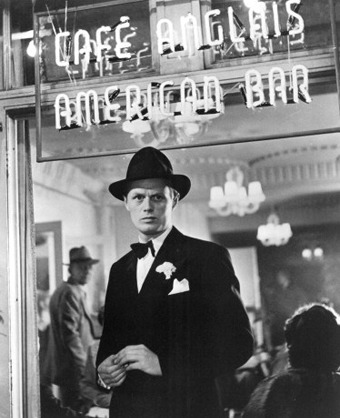
Harry Fabian from Night and the City: Friend or Foe? BRADY RICHARDS
FROM CRIMINAL ELEMENTSRichard Widmark as Harry Fabian from Night and the City: would you befriend this guy?About my relationships with fake people:I have good friends and bad friends. And worse friends. They fill different needs in my life – people to encourage me, people I’m glad to know but even gladder not to be, and people I end up not liking whatsoever. These are all people I have some connection to, something in common with, even when they do something I would never do. When I watch crime, noir, or thriller movies, I often wonder if I would have found myself in the same situation as the protagonist. Would I have made the same decisions—usually mistakes—as the protagonist? Would I have believed the charismatic villain? How much of a patsy am I? Would this guy have been my friend?Examine Harry Fabian in Jules Dassin’s 1950 noir, Night and the City, (based on novel by Gerald Kersh) played by Richard Widmark. Here’s a guy who cheats and lies and steals. He hurts everyone around him. But he’s trying, always trying, even if it means failure. And it always, always does. There are hundreds of things I never follow through on for fear of failure, or a belief that it’s too complicated to pull off. I have stacks of bar napkins with really good, beer-fueled ideas, but I do nothing with them. Harry doesn’t have the same laziness. Instead he’s mostly all talk, aggressively so. But dammit, I like the guy. Here’s someone that exists among the scum of the city. His cohorts are low-class swindlers, forgers, and frauds. His enemies are well-groomed, powerful men with crisp British accents and sinister names like Kristo and Fergus Chilk. And Fergus Chilk is just the bad guy’s lawyer! But he never judges any of these people—not even the ones trying to kill him. Harry may act irresponsibly and rashly, but he’s always keenly aware of what the responsibilities of failure are. And that’s pretty honorable, I have to say. for the rest go here:
http://www.criminalelement.com/blogs/...
Published on February 24, 2014 13:04
February 22, 2014
Great Bill Crider Bargain
Do You Have Your Copy?
 My book is being featured on Saturday February 22nd 2014 at eBookSoda, a new readers' site where they'll send you ebook recommendations tailored to your taste.www.ebooksoda.com.
My book is being featured on Saturday February 22nd 2014 at eBookSoda, a new readers' site where they'll send you ebook recommendations tailored to your taste.www.ebooksoda.com.
Published on February 22, 2014 11:45
February 21, 2014
REALLY EXTRAORDINARY PIECE BY DAVE ZELTSERMAN ON TOUCH OF EVIL
REally extraordinary piece by Dave Zeltserman on Touch of EvilTHURSDAY, MAY 3, 2012"All border towns bring out the worst in a country." Miguel "Mike" Vargas
In 1957 Universal Studios sent Orson Welles a script based loosely on Whit Masterson's* Badge of Evil, asking if he'd play the part of the crooked detective. According to Welles, the script was a very bad one, with not much in it other than a detective with a good record who plants evidence because he knows somebody is guilty -- and the fellow turns out to be really guilty. But Welles needed the money and agreed to do it. Universal then called up Charlton Heston who at the time was coming off the success of The Ten Commandments, and told him "Here's a script -- we'd like you to read it. We have Welles." Heston misunderstood and responded, "Well, any picture that Welles directs, I'll make." Universal, instead of correcting this misunderstanding, asked Welles if he'd direct. Welles agreed under the condition that he could rewrite the script. Universal let him do it, but would only pay him his original salary as an actor ($125,000) and not as a director or writer. And so was born Touch of Evil, which along with The Third Man, was arguably one of the greatest film noir movies from the 50s.
The opening sequence is the most famous in the movie: a three minute and twenty second uninterrupted crane tracking shot that follows a shadowy figure placing a bomb in a car and then an unsuspecting couple -- a wealthy American businessman and his stripper girlfriend -- entering the car and driving towards the US-Mexican border four blocks away, all the while (due to traffic, donkeys in the street, etc.) keeping pace with Miguel and Susan Vargas (Charlton Heston and Janet Leigh), newlyweds who are heading to the US side of the border in search of a chocolate soda. It isn't until the car enters the US side of the border that the car separates from Vargas and his wife and explodes into a deadly fireball.
While the bomb was planted on Mexican soil (a fictitious town called Los Robles which was patterned after Tijuana), the explosion occurred in the US, and is to be investigated by US officials. Vargas, a top Mexico City narcotics investigator, hangs around to offer his assistance as the police wait for Hank Quinlan to arrive. Orson Welles was 42 when Touch of Evil was filmed, but with the makeup to make his face appear swollen and bloated, the padding under his ever present overcoat, the thick cane he relies on and the camera angles to make his heft appear far heavier, Welles' Quinlan is massive. A bloated monstrosity of a man who looks like he's in his late 60s (another hint of his age is his wife had been murdered -- strangled to death -- thirty years earlier, the killer being the only criminal to escape Quinlan's justice).
When Quinlan arrives at the scene he makes quick intuitive guesses as to what happened and what needs to be investigated. Quinlan is a man of intuition and expediency while Vargas is more of a technocrat, a by-the-numbers straight-laced cop. Quinlan leads an expedition to the Mexican side of the border, a tawdry area lined with bars, strip clubs and brothels. Quinlan and his fellow cops descend on the strip club where the dead stripper had worked, eager to catch glimpses of naked flesh inside. In an alley outside the club, Vargas is attacked by one of the Grandi gang members (a parallel story is one of the Grandi gang trying to intimidate Vargas to drop a case against their patriarch), who throws acid at Vargas's face. In Welles' original script, the acid misses Vargas and hits a cat asleep in the trash. This was changed in the film and the acid instead explodes in a smoky hiss against the poster of the dead stripper.
As Quinlan leaves the back entrance of the Rancho Grande strip club, he is stopped by pianola music coming from a local brothel run by Marlene Dietrich (Universal Studios was later surprised and delighted to learn that Dietrich was in the film. They ended up paying her so they could give her billing, but she had been willing to be in it unbilled as a favor to Welles). Dietrich's brothel is a place of another era, complete with its pianola, mounted bull's head on the wall, and other aging artifacts. It's a place that Hemingway might've been comfortable in. Or Welles. As it is, it has been years since Quinlan had visited Tanya's (Marlene Dietrich) brothel, and at first she doesn't recognize him. When Quinlan wistfully identifies himself, Tanya prophetically warns him that he should lay off the candy bars. Even under all the padding and with camera angles to accentuate Quinlan's bulk, Welles was still a large man when he made Touch Evil (although he was going to get much larger) and he should've heeded that warning.
While Vargas is aiding in the investigation, Quinlan's partner Pete Menzies (played touchingly by Joseph Calleia) drives Susan Vargas to the Mirador Motel for protection against the Grandi gang (although, as it turns out the motel is owned by the Grandis) and to wait for her husband. The motel is both isolated and seedy, and the night clerk is played brilliantly by Dennis Weaver. Weaver's night clerk is a mass of spasms, twitches and leers. Someone who can barely make eye contact and jumps when Susan Vargas asks if he can make the bed, barking out the single question "Bed?" in return as if it were something fearsome and unholy. One can only wonder if watching Touch of Evil gave Hitchcock the idea of putting Janet Leigh in yet another bad motel setting. Quinlan's intuition leads him to suspect the dead man's daughter's boyfriend, a Mexican shoe clerk named Manolo Sanchez. Quinlan brings his fellow cops and prosecutors to Sanchez's claustrophobic shoebox-sized apartment, and then performs his sleight-of-hand -- hiding sticks of dynamite in a box so his unsuspecting partner will find them. As Quinlan waits for the dynamite to be discovered, he's an entertainer, amused by his own trickery. The problem though is the magic trick has been revealed -- Vargas had used the bathroom and knocked over the box where Quinlan later had planted the dynamite. He knows the box had been empty. He knows what Quinlan has done. The great magician has been exposed as a fake -- and Quinlan's reputation is in jeopardy of being destroyed. Quinlan is a corrupt cop but his motivation is because he knows he is greater than those mere mortals around him. He is doing nothing more than speeding up the convictions of the guilty. He doesn't financially profit from his corruption. In fact, later he demands from his partner, what has he got in life, a few acres and a turkey ranch? Critic Andre Bazin describes Quinlan as such:
Quinlan is physically monstrous, but is he morally monstrous? The answer is yes and no. Yes, because he is guilty of committing a crime to defend himself; no because from a higher moral standpoint , he is, at least in certain respects, above the honest, just, intelligent Vargas, who will always lack the sense of life which I call Shakespearean. These exceptional beings should not be judged by ordinary laws. They are both weaker and stronger than others. Weaker... [but] also so much stronger because directly in touch with the true nature of things, or perhaps one should say, with God.
Facing exposure and ruin, Quinlan enters an agreement with "Uncle" Joe Grandi, the new head of the Grandi organization. Joe Grandi, as played by Akim Tamiroff, is a wannabe Edward G. Robinson-type gangster, but is only comical and pathetic. An earlier scene has him running around with his toupee half off. Uncle Joe's plan is to frame Susan Vargas on trumped drug charges -- back at the Mirador Motel his gang had invaded Susan's room with a butched-up Mercedes McCambridge begging to be able to watch as gang members grab Susan's legs as she's dolled out in a negligee. Quinlan is now drinking for the first time in years, waiting until the last moment to go along with Uncle Joe's plans (in fact calling up headquarters at the last possible moment to see if Sanchez has confessed yet -- he may have framed him, but he intuitively knows the man is guilty). When Quinlan finally enters the cheap downtown hotel room where Grandi had Susan brought , she is in bed, unconscious, with reefers and heroin needles scattered about the room (as a concession to the times and the censors, she had been drugged with sodium pentothal - with nothing else done to her. Come on! Sodium pentothal? In real life, she would've been shot up with heroin, and each of the gang members -- including Mercedes McCambridge would've had a turn with her!). Quinlan has other plans -- namely to strangle Uncle Joe and leave his body with Susan. Quinlan's actual murder of Uncle Joe is a gruesome, violent scene, intentionally sexually charged. As Welles said in conversations with Peter Bogdanovich** "It was perverse and morbid... one of those go-as-far-as-you-can-go--in that kind of dirty department... when [Tamiroff] looked at the gun, it was every cock in the world. It was awful, the way he looked at it--made the whole scene possible." Make no mistake about it, this is an ugly scene. Tamiroff is a much smaller man than Welles, and is just about consumed by Welles. Tamiroff's character is dragged around the room, his shirt torn at the chest, his toupee knocked off. Eventually Quinlan strangles him with one of Susan's stockings, leaving Uncle Joe's face hanging over the bed, eyes bulging out by a nice effect of using painted contact lenses. Welles wanted the shot of the bulging eyes short enough so it would be almost subliminal -- something people wouldn't be quite sure they saw -- but the studio added extra frames to that shot. More on that later. When Quinlan leaves the room a close up of a sign on the door reads:
Stop, Forget Anything, Leave Key at Desk.
After Quinlan leaves, Susan Vargas wakes up from her sodium pentothal-induced stupor to see Uncle Joe's dead bulging eyes staring at her and she runs screaming to the balcony. Later, after she's been arrested, Pete Menzies confronts Vargas. Quinlan had forgotten something in the hotel room. His cane. And Menzies had found it. He can no longer ignore the fact that he's been an unwitting dupe in framing scores of criminals (probably all guilty). He agrees to help Vargas uncover the truth about Quinlan by wearing a recording device. After the murder, Quinlan had holed up at Tanya's brothel. Drunk, he asks her to read his fortune. She tells him he has no future, it's been used up. Menzies later lures Quinlan out of the brothel so he can coax a confession out of him. Quinlan leads Menzies along a desolated area along the canal and oil derricks, while Vargas has to climb mountains of trash and wade through filth to try to record Quinlan's guilt. Eventually Quinlan incriminates himself, but with Vargas and his recording equipment under a bridge, an echo can be heard of Quinlan's voice, leading Quinlan to realize the level of betrayal. Quinlan shoots Menzies and then tries to kill Vargas before being shot by his dying partner. After Quinlan is shot he tells his partner that's the second bullet he's taken for him. For years that line puzzled viewers. The reason for that was in Welles original version, Menzies had earlier told Susan Vargas how Quinlan had taken a bullet for him -- saved his life, but left Quinlan with his limp and needing his cane. The studio edited version had cut the scene, and it wasn't until the 1998 version was released that the scene was re-added and Quinlan's last mocking line made sense. After being shot, Quinlan falls backward into the canal and the filth where he dies. Tanya arrives at the scene with the DA (who announces that Sanchez confessed to the crime after all) and provides as a eulogy to Quinlan: He was some kind of a man. What does it matter what you say about people?
Welles on Quinlan's betrayal***:
Quinlan is [Menzies's] God. And as Menzies adores him, the real theme of the script is betrayal; the terrible necessity for Menzies to betray his friend. And that's where there is ambiguity, because I don't know whether he should have betrayed him or not. No, I really don't know. I force Menzies to betray him, but the decision does not come from him, and frankly, in his place, I would not have done it!
While Welles was making Touch of Evil he was under the impression that he was going to be making more movies for Universal, that Touch of Evil was going to be his entry back into Hollywood. When the studio saw his final cut version, he was fired as director and barred from the lot. Touch of Evil is a wonderfully dark movie, but for 1958, it was probably too dark and too strange for Hollywood, and it hit on difficult themes: police corruption, racism and drugs. The studio must have felt as betrayed by Welles as he did by the studio. While Welles would make other films, notably Chimes at Midnight, The Trial and F is for Fake (along with a slew of half-finished films), this would be Welles last hollywood film. And as a final act of betrayal, the studio re-edited Touch of Evil. Welles would later write a 56-page memo requesting changes back to his original film, which the studio ignored (the 1998 version attempted to restore movie according to Welles memo). Funny how art mirrors life.
* Whit Masterson was a pseudonym for Wade Miller -- aka Robert Wade and William Miller.
** From This Is Orson Welles by Orson Welles and Peter Bogdanovich
*** From Orson Welles Interviews edited by Mark W. Estrin
I originally wrote this essay in 2006 for the Borderland Noir issue of Hardluck Stories edited by Craig McDonald.
POSTED BY DAVE ZELTSERMAN AT 3:28 PM
Published on February 21, 2014 13:00
February 20, 2014
TROTSKY'S RUN by Richard Hoyt reviewed by Ben Boulden GRAVETAPPING
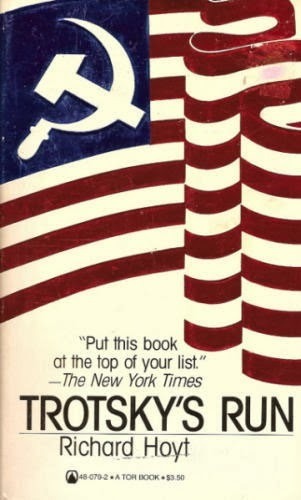
Two of the major players in the novel are historical figures. Leon Trotsky and Kim Philby. Trotsky’s role in the novel develops slowly as the novel unfolds, but Philby’s role is central and obvious. Philby wants out of the Soviet Union—where he defected in 1963—and he has information to trade with the United States for safe passage.
Philby’s claim is bombastic. The likely victor of the upcoming presidential election is an officer of the KGB. The information is received a few weeks before the election, and the CIA is in a quagmire. Is Philby’s intelligence factual, or is it nothing more than Soviet disinformation. A quick and dirty plan is hatched; two CIA officers will extract Philby from Yalta, where he is vacationing, and interrogate him to determine the validity of the evidence.
Trotsky’s Run is as smooth an espionage novel as you will read. The prose is sparse and economical. It is long on narrative and short on dialogue. The plot is crisp, complicated, and at times outlandish—although not in bad way, but rather in a mildly satirical manner that feeds off extreme cold war paranoia.
Kim Philby’s historical narrative is interesting and, what I know about his activities before he defected, even accurate. His role in the capture and execution of dozens of agents in communist Albania, and in the capture of Soviet defector Konstantin Volkov are two of the more interesting, but also detailed—if briefly—Philby’s early marriage to a young Austrian communist in Vienna, and his later pro-fascist stint as a journalist in the Spanish Civil War.
Trotsky’s Run is an excellent novel. It is witty and humorous—in the manner a suspense novel should be humorous, through the dialogue. It is both intelligent and entertaining, and while the overarching plot is somewhat fantastical Mr Hoyt is able to make it seem believable by infusing the storyline with historical events and peoples—think Trotsky and Philby—that give it a certain plausibility.

Published on February 20, 2014 14:56
February 19, 2014
The Stark House newsletter
Hello, Everyone—When I wished everybody a Happy New Year last time, I neglected to mention cold and flu season. It's miserable but can be an effective weight loss program. Like all such things, the problem isn't taking it off, it's keeping it off. Once you stumble out of bed. All told, the gym membership probably makes for a better resolution.Read any good books lately? Hopefully you've delved into the Charles Williams volume that shipped last month and get your taste, be it new or a refresher, of this fine author.
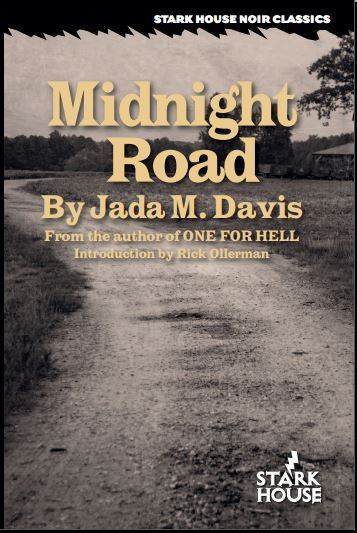 Jada M. Davis's wonderful and moving The Midnight Road is shipping this week and my guess is that at this time next year you'll see it on many "Best of" lists for 2014. James Reasoner already listed it for 2013 but he only saw an advanced copy. He listed it on his blog as a book "not even out yet that you need to remember so you can grab [one] later on":MIDNIGHT ROAD, Jada Davis (another almost lost hardboiled masterpiece from Davis, and a fine coming-of-age novel at the same time)Crime Club members should be receiving their books now, but if you're not a member and want a copy, remember all our books are shipped well-protected in wraparound cardboard containers--no envelopes here.
Jada M. Davis's wonderful and moving The Midnight Road is shipping this week and my guess is that at this time next year you'll see it on many "Best of" lists for 2014. James Reasoner already listed it for 2013 but he only saw an advanced copy. He listed it on his blog as a book "not even out yet that you need to remember so you can grab [one] later on":MIDNIGHT ROAD, Jada Davis (another almost lost hardboiled masterpiece from Davis, and a fine coming-of-age novel at the same time)Crime Club members should be receiving their books now, but if you're not a member and want a copy, remember all our books are shipped well-protected in wraparound cardboard containers--no envelopes here.In the Department of Special Announcements, Stark House is quite proud to announce a forthcoming edition of two of legendary author Ed Gorman's finest private eye novels, The Autumn Deadand The Night Remembers.
The Autumn Dead features Jack Dwyer, one-time cop now part-time actor and private investigator. The Night Remembers is the only full-length Jack Walsh novel. We'll update you more on these as the books make their way through the production process.
Closer to the release schedule, we have the forthcoming John Trinian volume going to the printer for review copies. That one features some fine writing by an enigmatic character who said of himself that he didn't write literature, he wrote pulp fiction. Trinian, whose real name was Zekial Marko, whose original name was Marvin Schmoker, clearly has a different idea of what "pulp fiction" means than most of the rest of us. He is the author of only seven novels, some more crime-oriented than others, but more literate character-based crime fiction would be difficult to find.
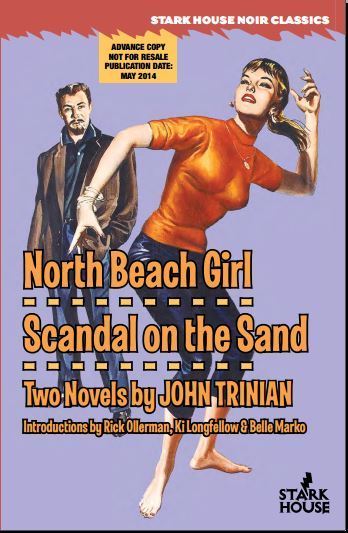 And once again, the standard disclaimer:
And once again, the standard disclaimer:If you wish to get our latest releases still warm from the printer's pressers, you can always sign up for our Crime Book Club and take advantage of discounts and deals on back list titles for new members.
And if you wish to subscribe or even unsubscribe to this newsletter,drop us an e-mail and we will make it happen.
Cheers,
Rick Ollerman
Associate Editor,
Stark House Press



Published on February 19, 2014 13:04
February 18, 2014
the great jake hinkson Noir’s Goon Squad: Dorothy Malone
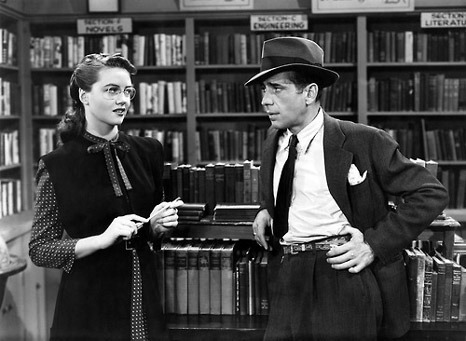
So the sexy librarian image begins here!The one scene that every film noir remembers Dorothy Malone for is her brief appearance in Howard Hawks’s 1946 adaptation of The Big Sleep.Private eye Philip Marlowe is investigating a phony bookshop that operates as the front for a pornography ring. He ducks into the legitimate book store across the street to see if the proprietress there can give him any info on her creepy neighbors. And who should he find except the prettiest girl in the world.
He questions her. Her hair is up and she’s wearing glasses—but she has that sexy librarian vibe, especially when she tells him, “You begin to interest me…vaguely.”She tells him what he needs to know about the creep next door. He starts to leave, but it’s raining outside and when she says, “It’s coming down pretty hard out there” something in her voice insinuates that she’s not interested in the weather.When she gives him the sexy librarian look again, he says, “You know, as it happens I have a bottle of pretty good rye in my pocket. I’d a lot rather get wet in here.”She flips the sign and lowers the shade, takes off her glasses and lowers her hair. “Looks like we’re closed for the rest of the afternoon.”And...fade to black.That, folks, is how you implied fornication in 1946.The scene is greatly expanded from Raymond Chandler’s source novel (Chandler’s Marlowe is far more sexually uptight—even repressed—than Hawks’s Marlowe). In keeping with the film’s freewheeling, let’s-just-be-entertaining ethos, the scene was included Hawks later said, “Just because the girl was so damn pretty.”
for the rest go here:
http://www.criminalelement.com/blogs/...
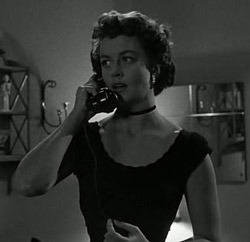
She was pushed into roles like this one in Pushover...
Published on February 18, 2014 14:57
Ed Gorman's Blog
- Ed Gorman's profile
- 118 followers
Ed Gorman isn't a Goodreads Author
(yet),
but they
do have a blog,
so here are some recent posts imported from
their feed.



